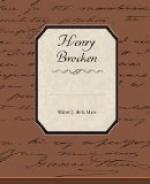“You are a very lonely little girl,” I said.
“I am building in the sand,” she answered.
“A castle?”
She shook her head.
“It was in dreams,” she said, flushing darkly.
“What kind of dream was it in then?”
“Oh! I often dream it; and I build it in the sand. But there’s never time: the sea comes back.”
“Was the tide quite high when you began?” I asked; for now it was low.
“Just that much from the stones,” she said; “I waited for it ever so long.”
“It has a long way to come yet,” I said; “you will finish it this time, I dare say.”
She shook her head and lifted her spade.
“Oh no; it is much bigger, more than twice. And I haven’t the seaweed, or the shells, and it comes back very, very quickly.”
“But where is the little boy you play with down here by the sea?”
She glanced at me swiftly and surely; and shook her head again.
“He would help you.”
“He didn’t in my dream,” she said doubtfully. She raised long, stealthy eyes to mine, and spoke softly and deliberately. “Besides, there isn’t any little boy.”
“None, Annabel Lee?” I said.
“Why,” she answered, “I have played here years and years and years, and there are only the gulls and terns and cormorants, and that!” She pointed with her spade towards the broken water.
“You know all their names then?” I said.
“Some I know,” she answered with a little frown, and looked far out to sea. Then, turning her eyes, she gazed long at me, searchingly, forlornly on a stranger. “I am going home now,” she said.
I looked at the house of sand and smiled. But she shook her head once more.
“It never could be finished,” she said firmly, “though I tried and tried, unless the sea would keep quite still just once all day, without going to and fro. And then,” she added with a flash of anger—“then I would not build.”
“Well,” said I, “when it is nearly finished, and the water washes up, and up, and washes it away, here is a flower that came from Fairyland. And that, dear heart, is none so far away.”
She took the purple flower I had plucked in Ennui’s garden in her slim, cold hand.
“It’s amaranth,” she said; and I have never seen so old a little look in a child’s eyes.
“And all the flowers’ names too?” I said.
She frowned again. “It’s amaranth,” she said, and ran off lightly and so deftly among the rocks and in the shadow that was advancing now even upon the foam of the sea, that she had vanished before I had time to deter, or to pursue her. I sought her awhile, until the dark rack of sunset obscured the light, and the sea’s voice changed; then I desisted.
It was useless to remain longer beneath the looming caves, among the stones of so inhospitable a shore. I was a stranger to the tides. And it was clear high-water would submerge the narrow sands whereon I stood.




